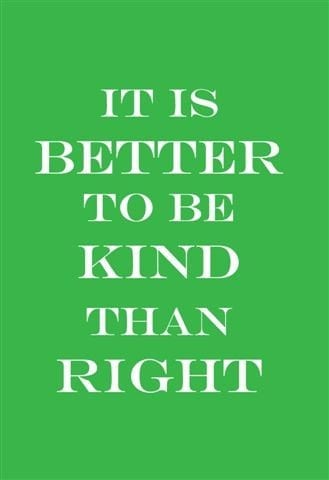
The above message was created by Anne Harwell and I am using it here to illustrate the typical malaise that is characteristic of our culture and our civilization.
So what's wrong with the above banner? It triumphantly states that "it is better to be kind than right". By claiming that, the statement establishes a tacit assumption that to be kind means to be wrong. Then, it takes a 'wiser' stance and claims that, be all that as it may, it is still better to be wrong, but kind.
The question that immediately comes to mind is: "Based on whose authority do these people claim that to be kind is to be wrong?" And if that's indeed the case, based on what authority are we now to accept that it is better to be wrong (i.e. kind) than to be right?
This false dichotomy, the erroneous pitting of being kind against being right, is a clearcut case of intellectual weakness. The author blindly accepts the idea that one cannot possibly be kind and be right at the same time. But one needs to stop and ask oneself: "Why would being kind mean that one is wrong?"
The problem lies precisely in that question. Somewhere along the line, people have made this unexamined assumption that being kind equates to being wrong. It would be pretty much impossible to determine why and how did that terrible miscalculation arise. Still, the erroneous thinking is here, as witnessed in the above poster.
To remedy this terrible confusion, I will say that to be kind always means that one is right. There is no exception to this rule. Any time you are being kind, you cannot help but be right.
In the light of this realization, one can more easily see how tragically misguided is the sentiment that formulated the above poster.
